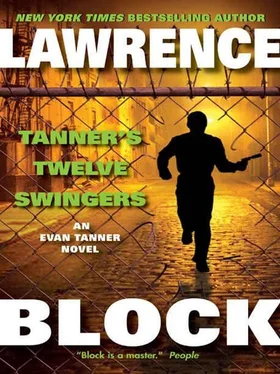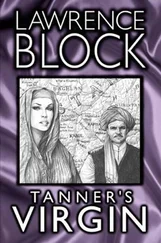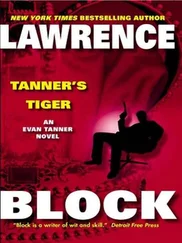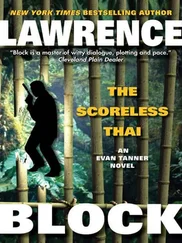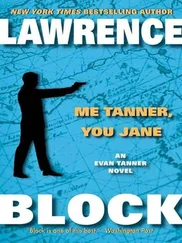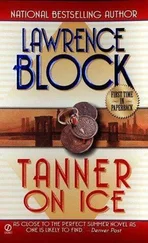“We took a platoon of sixty of them by night, Evan. We garroted the sentries with wire nooses and we murdered the rest of them in their beds. There were only eight of us. We used knives, long knives. One or two awoke, but none had time to cry out. We were very swift, and most of them died sleeping. We killed them all but one.
“And that one, Evan, we left alive. We roused him from his sleep and took him from bed to bed and showed him all of his dead comrades, and we told him why they had been killed and that all Ustashi murderers could expect to die. And then we crushed his hands and feet with rifle butts and we put out his eyes so that he would never be able to recognize us. But we left him alive, Evan, and we left his tongue in his head. You see, we wanted him to be able to tell others what had happened and why. And do you know, after that night, there was a great decrease in Ustashi terror in that sector of Montenegro. A great number of their men deserted.”
“And the man with the crushed hands and feet?”
“He still lives, Evan. He is in a sanitarium outside of Zagreb. He is only – let me see – not yet forty, I would say. He was a boy of fifteen when the massacre occurred.”
“Fifteen-”
“Fifteen years. A schoolboy. And yet he had murdered Serbian infants and old women. Fifteen years, and my own men and I crippled and blinded him.”
He fell silent for a moment or two. Then he said, “I have not talked of that boy for many years. I have tried not to think of him. I know that what we did that night was necessary. It saved lives, it shortened the war, it helped far more persons than the sixty who suffered in it. Yet I cannot forget that boy. It was I myself who put out his eyes, Evan.” He held out his hands and looked at them. “I myself. Do you wonder that I hate war, Evan? And governments? And large nations making larger wars?”
“You did what you had to do, Milan.”
“In a better world,” he said, “I would not have had to do it.”
We spent that night in a forest. There was an abundance of fallen half-rotted timber lying about, and I built a small fire in a clearing, and we camped around it. Milan slept while I tended the fire. He got up about the same time the sun did. He yawned and stretched and smiled. “I have not slept on the ground in more than twenty years,” he said. “I had forgotten how comfortable it is. Have we any food?”
“No.”
“Excuse me. I will be back soon.”
I assumed he was off to perform some sort of lavatory function and when he hadn’t returned after a quarter of an hour, I was certain he was either in trouble or in very ill health. But he came back beaming with a dead rabbit in one hand and a bloody knife in the other.
“Breakfast,” he announced.
The hare was a doe, nice and plump. He skinned it and sectioned it with astonishing skill. We cut a pair of slim branches from a tree and impaled pieces of rabbit meat upon them, then roasted them over our little fire. A sort of lapin en brochette, or rabbitkabob. It wasn’t the most suitable breakfast in the world, but it was tasty and filling.
I asked Milan how he had caught the hare. He shrugged as if it were the sort of thing any fool ought to be able to accomplish. “I found a place where hares were likely to be,” he said, “and I waited until this one appeared and I brained her with a rock. Then I cut her throat and bled her and brought her here.”
And later, after we had talked of other things and had quite forgotten the little doe, he said, “The only hard part is hitting them with the stone. You have to drop them on the first cast. The rest is just a matter of moving in silence and keeping one’s eyes open.”
It took me a moment to realize that he was referring to hares. My first thought was of the Ustashi sentries. Hunting is the same sort of business, I suppose, whatever the quarry.
We were in Krakow by nightfall. We spent most of our time in horse-drawn carts, which was fine with me. I was at least as bored with hiking as Milan was and equally tired of the countryside. I wanted to be in a warm house in a city where I could get a bath and a shave and clean clothes. Our dirty, unshaven faces were a good disguise – we looked entirely too disreputable to be persons of any importance – but mine, at least, was a nuisance. It itched. So, for that matter, did the rest of me, especially under the damned oilcloth packets.
We entered Krakow from the east, passing first through the new city of Nowa Huta. It had all been built up after the war to accommodate workers at the Lenin Metallurgical combine. We passed through streets laid out in neat geometrical monotony, street after street of identical rows of semidetached houses. Little boxes made of ticky-tacky. We might as well have been in Kew Gardens. The twentieth century imposes its own special brand of monotony whenever it’s given a free hand, and it doesn’t seem to matter whether the government is capitalist or socialist or fascist; either way, the end result is a sort of Levittown of the mind.
After Nowa Huta, clean and fresh and modern and sterile, Krakow was a glorious relief. The city was one of the very few in Poland to remain intact throughout the war. There were no bombings by either side. The population was largely devastated, of course – Oswiecim, which the Germans called Auschwitz, is only thirty miles to the west. But the castles and cathedrals and old buildings remain, and the city is beautiful.
I steered us through the center of the city, into the oldest section around the Jagiellonian University, a center of Polish learning for over six centuries. Copernicus studied there, and later determined that the earth was not the center of the universe. My comrades in the Flat Earth Society are inclined to dispute this and perhaps they are right. What does the movement of stars and planets have to do with the center of the universe? Milan ’s universe was centered in a Montenegrin town called Savnik. The center of the world for Tadeusz Orlowicz was indisputably Krakow, however frequently he found it advisable to leave it.
And the center of my own universe? I pondered this in silence while we walked through the narrow old streets of the student quarter. There was, I decided, no permanent center to my universe. Sometimes it was a hut in Macedonia, sometimes a cottage in Hungary, sometimes an apartment on West 107th Street. I wondered if it might be important for a man’s universe to have a center and if there was any vital self-discovery I could make through the realization that mine did not. Men have told me that they like to sleep every night in the same bed. If I slept, perhaps I would feel this way.
But self-analysis and self-absorption are subtle forms of self-destruction, leading sooner or later to what Hindi call nirvana and psychiatrists call catatonia. The center of the universe, for the moment, was Krakow, and the man at its very hub was Tadeusz Orlowicz. I did not know where he lived – he found it advisable to move frequently, and to keep his address a secret – but I did know where I might be likely to find him, or to get word of him.
We worked our way in and around the university district. In an alley off Wislna Street was a small cafe of which I had often heard in the past. It appeared to be closed, but I had been told that it almost invariably appeared to be closed. I went to the door and rang the bell, one long, two short, two long, three short. Then I waited for approximately three minutes before repeating the process.
An old woman, dressed in loose black clothing, opened the door a crack and peered out at me.
I said, “My friend and I are fond of roasted partridge and understand it is obtainable here.”
“It is out of season,” the old woman said.
“Some game is always in season.”
Читать дальше
